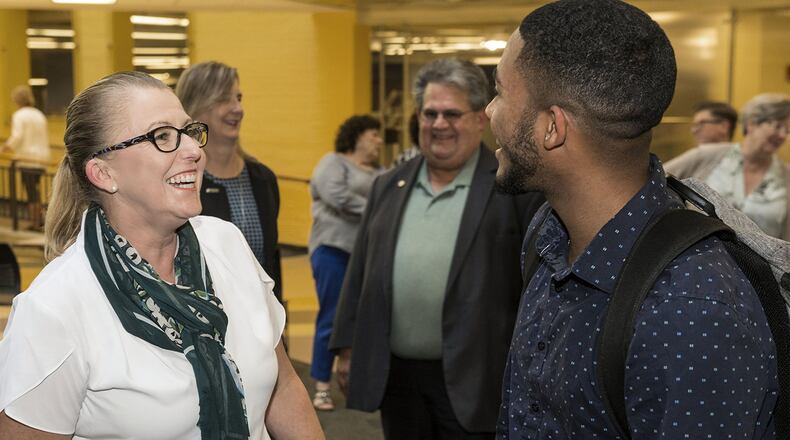After years of budgetary problems, looming legal issues and a faculty strike, WSU at the beginning of this academic year welcomed fewer students to campus than it had in nearly 40 years.
The university today has about 12,500 students, down from more than 17,000 in 1991. About 2,000 of those students are graduate students.
MORE: Local home sales hit record highs
WSU trustees slashed about $31 million from the school’s budget in 2017. That wasn’t enough, and the school then cut spending by some $53 million in fiscal 2018.
“The last five years have been brutal to this university,” Edwards said in her first face-to-face interview with the Dayton Daily News since officially assuming the university’s presidency Jan. 1. “News story after news story of what I call the wrong narrative. We have to start telling our story about all the great things that have happened here.”
Among the university’s several legal stumbles, perhaps the most serious culminated in November 2018 when university trustees took responsibility for visa fraud offenses and agreed to pay the federal government $1 million, a fine that has since been paid, Edwards and a university spokesman said.
MORE: Express to close nearly 100 stores
According to an agreement with federal prosecutors, leaders of Wright State acknowledged entering into several sponsored research contracts with a private Dayton software company called Webyoga, Inc. As part of the contracts, Wright State would employ software engineers, obtain H-1B visas for those employees, and pay their salary and benefits as employees of the university.
Wright State did not disclose in the visa applications that it knew the employees would actually be working for Webyoga, federal prosecutors said.
The university invoiced Webyoga for more than $1.8 million for fees associated with the visas, the employees’ salaries and benefits and other costs, according to the government.
That will never happen again, Edwards said.
“There was a long time here when there were not guard rails in place,” she said. “All of those guard rails are in place now.”
She faulted what she called a “lack of policy and procedure” for leading to previous problems.
“There was a lack of compliance, and we actually have now a dedicated compliance officer,” Edwards said, adding that the new officer is a “split report” to both Edwards and the board of trustees who oversees her.
The new president said the university is growing healthier. Wright State is approaching $72 million in reserves. Some 80 percent of its graduates remain in the Dayton area, making it uniquely important to the region, she contends.
“We are the economic engine for the future of this region,” she said.
MORE: Ohio boosts minimum wage to $8.70 an hour
To emerge from what she calls “crisis mode,” the university has taken several recent steps. It has created a new “undergraduate retention team” of four retention managers and two student advocates. In October, WSU announced an “academic performance scholarship” for first-year students who graduate from high schools in Montgomery and Greene counties. The award is $2,000 and renewable for four years, and will be awarded beginning in the fall semester of 2020.
And Wright State has expanded international recruiting, partnering with two recruiting organizations, in India and in Turkey.
A native of Australia and a former biology professor, Edwards joined Wright State in 2018 as executive vice president for academic affairs and provost. She held dual roles for a time after the immediate past president, Cheryl Schrader, stepped away from duties and officially took office Jan. 1.
MORE: Critical EMT jobs in demand across region
MORE: Dayton event to explore new war-fighting technology
Edwards said she hopes to offer a new tone and emphasis in office, stressing “relations, recruitment and retention.” She calls union employees “part of the Wright State family.”
“If you want the best out of people, you just have to treat people the way you wish to be treated yourself,” she said.
About the Author

